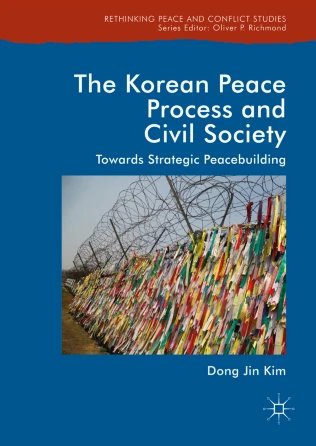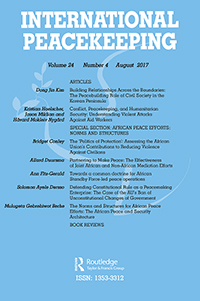Towards Strategic Peacebuilding
The Post-Cold War era witnessed a dramatic rise in breakthroughs for peace processes, including the Korean peninsula, between parties mired in protracted conflict. However, many such processes broke down within a short period of time. This book explores the possibilities for comprehensive and sustainable peacebuilding strategy in the Korean peace process, beyond reaching an agreement, by reviewing diverse peacebuilding activities from government and civil society.
A Comparative Case Study on the Northern Ireland and Korean Peace Processes
In both Northern Ireland and Korea, the euphoria following significant breakthroughs towards peace in the late 1990s and early 2000s turned into deep frustration when confronted by continuous stalemates in implementing the agreements. I explore the two peace processes by examining and comparing the breakthroughs and breakdowns of both, in order to identify potential lessons that can be shared for a sustainable peace process. Using a comparative case study, I demonstrate the parallels in historical analyses of why the agreements in the late 1990s and early 2000s in Northern Ireland and Korea were expected to be more durable than those of the 1970s. I also examine the differences between the two peace processes in the course of addressing major challenges for sustaining the two processes: disarmament; relationships between hard-line parties; cross-community initiatives. These parallels and differences inform which lessons can be shared between Northern Ireland and Korea to increase the durability of the peace processes. The comparative case study finds that the commitment of high-level leadership in both conflict parties to keeping negotiation channels open for dialogue and to allowing space for civic engagement is crucial in a sustainable peace process, and that sharing lessons between the two peace processes can be beneficial in finding opportunities to overcome challenges and also for each process to be reminded of lessons from its own past experience.
The Peacebuilding Role of Civil Society in the Korean Peninsula
The expectations for the role of civil society are growing due to an abysmal record of high-level political leadership in reaching an agreement and a sustainable peace process. How much impact can civil society have and what roles can it take in the peace process? This case study of South Korean civil society shows how the civil society was able to bridge the horizontal and vertical boundaries of the Korean conflict with the support of a global civil society, and created a hospitable public atmosphere for the peace process in the 1980s and 1990s. However, the space for the civil society to make a contribution in the Korean peace process required the interdependency of the roles of high-level and civil-society leadership in the interplay between the international and domestic political environments. The peacebuilding role of South Korean civil society demonstrates that the horizontal capacity of civil society alone cannot guarantee a breakthrough and sustainability in a peace process, but if it is coordinated with the vertical capacity, civil-society peacebuilding can be a useful platform for sustainable peacebuilding.
linking development and peacebuilding on the Korean peninsula
This article discusses the link between development and peacebuilding to analyze South Korean aid activities in North Korea in the context of the Korean conflict, where there are deep-rooted cycles of conflict episodes, and to explore the possibility of aid for peace on the Korean peninsula in the future. The Korean conflict is a large part of what makes South Korean aid to North Korea ineffective. For the past 20 years, South Korean aid to North Korea has fluctuated greatly, due to the context of the Korean conflict. The Korean conflict, once seemingly on the way to resolution, appears to have reverted to a time before the end of the Cold War. Many people in both the North and the South still see each other as the enemy. Most of the South Korean aid projects in North Korea have been suspended indefinitely and the fluctuation of aid to North Korea caused serious debates within South Korean society. At one point, the debates grew so heated that they were called the ‘South–South conflict’. Building on the conceptual framework of conflict sensitive development and strategic peacebuilding, this article argues that, to overcome the current impasse, all stakeholders must better understand the context of the Korean conflict and the interaction between the context and themselves, and develop a comprehensive strategy together, to encompass the multiple issues raised by the Korean conflict, as strategic peacebuilding proposes.




